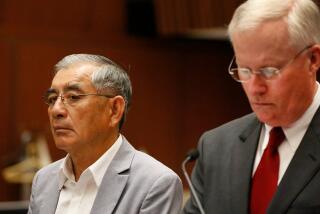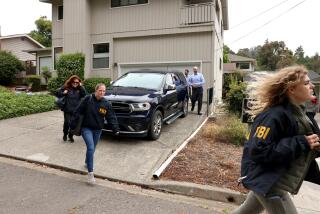Paul Koh Followed Hyundai Bosses, His Lawyer Says
Paul Koh, the Hyundai Motor America controller charged with hiding illegal campaign contributions to Rep. Jay Kim (R-Diamond Bar), was simply following the actions started in 1992 by his superiors, including then company President J.O. Chung, Koh’s attorney said Wednesday.
“The government wants you to believe Paul Koh was the driving force behind a sinister plot,” attorney Bart Williams said in his opening statement to the jury at Koh’s federal trial in downtown Los Angeles.
A seven-man, five-woman jury will decide whether Koh, 44, laundered $4,500 from the Fountain Valley-based corporation into Kim’s election campaign, a crime that carries up to 10 years in federal prison.
A 3-foot-wide copy of a $4,500 check allegedly used to make five smaller checks that were deposited into Kim’s election campaign was displayed in the courtroom, showing Hyundai President Chung’s signature of authorization.
In his opening statement, Assistant U.S. Atty. Edward B. Moreton Jr. said that despite knowing it was illegal for a corporation to make a contribution to a federal election campaign, Koh carried out a secret scheme to funnel money to Kim.
Koh and other Hyundai employees “were able to deceive the government. The deception will end at this trial,” Moreton said.
Hyundai already has pleaded guilty to laundering illegal contributions to Kim and paid a $600,000 fine. No other Hyundai employees have been criminally charged. Kim is the subject of an ongoing grand jury investigation.
The first witness, Dottie Diemer, Hyundai’s manager of public relations, testified that she became aware on Aug. 7, 1992, of a $350 check written by Koh for a fund-raiser for Kim. She said she told Koh by phone that it was illegal and he needed to retrieve the check as soon as possible.
Prosecutors say the check is important because it shows that Koh, if not previously aware of the law, was made aware of it by Diemer.
Diemer testified that she had also told company president Chung about the law against corporate campaign contributions on at least two occasions. She said one occasion was before a meeting between Chung and Rep. Dana Rohrabacher (R-Huntington Beach). “I told him that if he [Rohrabacher] asks for a contribution, tell him you cannot because it is against the law.”
Another witness, James Hannefield, vice president of financial affairs for Hyundai from 1991 to 1994, described a peculiar notation on the $4,500 Hyundai check. Hannefield said the check, made out to another Hyundai vice president, contained the notation “special bonus.” He said that was the only “special bonus” check he had ever seen, except for those paid to the president of the company.






